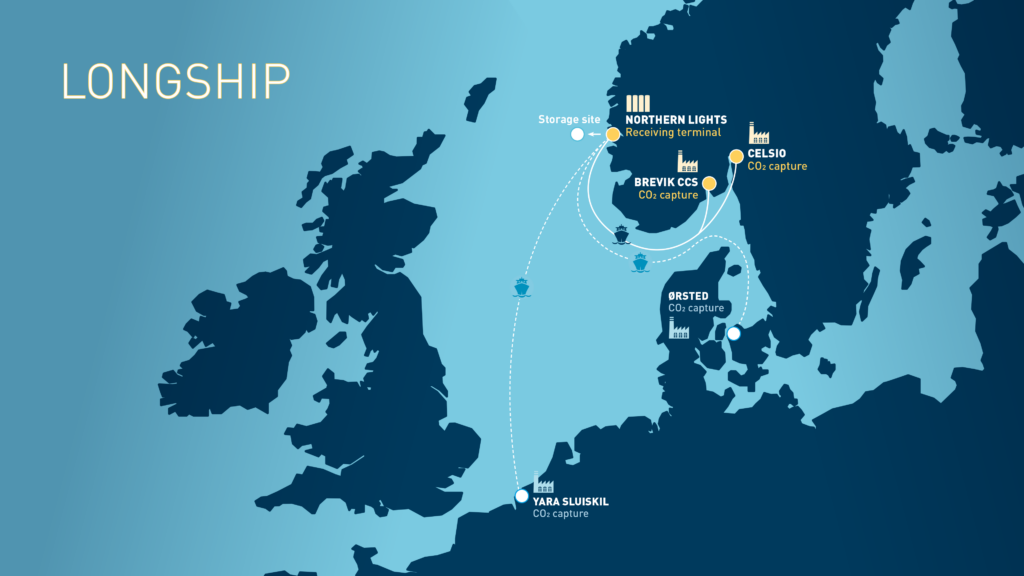
25.03.2024
Gassnova; Sharing of risk paves the way for Longship
Harald Anvik leads a dedicated team at Gassnova responsible for the follow-up of Longship. On behalf of the Ministry of Energy, the team oversees the state’s interests in the CCS project.
The state is engaged in Longship as a response to global climate changes. Carbon capture and storage (CCS) is an important measure to reduce Norway’s carbon footprint, and the main goal of Longship is to demonstrate that a full CCS chain can be realized. As Longship is developed, experiences are also shared with other European countries – where CCS technology is gradually gaining a strong foothold. Northern Lights, with its transport and storage infrastructure, has already secured new volumes from Yara in the Netherlands and from Ørsted in Denmark, where CO2 from these will be stored on the Norwegian continental shelf.
Disbursement of support for construction of the facilities
The state has allocated significant funds to establish Longship as a CCS chain, and part of Gassnova’s responsibility is to disburse the correct support to the actors for the construction of the facilities. The actors themselves are responsible for constructing the facilities, and they will own and operate the facilities upon completion.

Risk distribution and risk-based follow-up
The state’s choice to support a whole chain, with capture, transport, and storage, is key to Longship becoming a reality. The state has taken on significant responsibility as a risk mitigator between the actors, to give them the opportunity to frame their own project with acceptable uncertainty.
Based on the actors’ reporting and the progress of the projects, Gassnova conducts its own risk assessments and analyses to advise the Ministry of Energy, and to protect the state’s position in the contracts. – Risk-based follow-up is key to a small team being able to monitor the support agreements, and the significant funds the state has made available for Longship. Gassnova sits close to the actors and understand the developments in the projects, this is key to using resources effectively, especially when projects encounter challenges, says Harald Anvik.
“Uncharted Territories”
The full-chain CCS in Longship represents “Uncharted Territories “. The project follow-up team at Gassnova has been impressed by the industrial partners’ efforts to find solutions to challenges no one before them has had to deal with – from working at the interface between facilities, to preparations for operation, and to unforeseen delays in the construction process, especially with the effect of challenges around Covid and the war in Ukraine. Building facilities to be integrated into existing factories is particularly difficult. It is important not to underestimate the scope of integration, available power, necessary areas, regulations, and the like.
Knowledge sharing and social responsibility
Parallel to the construction projects, one of the goals of Longship is to drive knowledge sharing. This is especially true for new actors with CCS in the pipeline. A number of European authorities, representatives from politics, business, and media have visited the facilities in Brevik, Oslo, and Øygarden outside Bergen. Significant efforts are made by industrial actors to meet the state’s expectations in this area.
– A big thank you to Heidelberg Materials, Hafslund Oslo Celsio, and Northern Lights for welcoming visitors who want to see a real CCS facility being built. We are also very satisfied with how the dialogue between the local community and the developers is proceeding in the project. The facilities are located close to the residents’ daily lives, and there will always be challenges with large construction activity. But the impression is that individual cases are resolved as well as possible, precisely through good local dialogue. At the same time, we are pleased that among others, the industrial actor Heidelberg Materials employs locally as their facility in Brevik is eventually prepared for start-up, says Harald.
What have you learned?
The greatest lesson, or rather confirmation, is the importance of collaboration and flexibility. It is also very important to have robust and well-developed agreements in place. The expectations set in the state support agreements also provide a more open and tidy dialogue between the stakeholders in Longship. An advantage for the project is also the traditionally good interaction between the state and the business/industrial sector in Norway. This is something our foreign partners do not always experience at home, and which is well noticed during visits to the Longship actors in Norway, concludes Harald Anvik at Gassnova.
